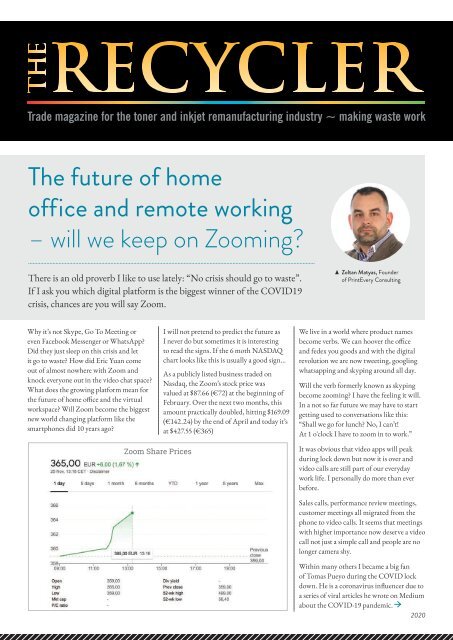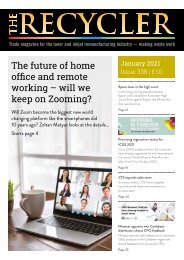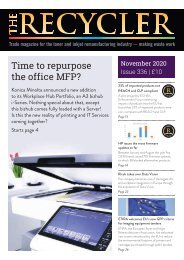The Recycler Issue 338 - Zooming
You also want an ePaper? Increase the reach of your titles
YUMPU automatically turns print PDFs into web optimized ePapers that Google loves.
<strong>The</strong> future of home<br />
office and remote working<br />
– will we keep on <strong>Zooming</strong>?<br />
<strong>The</strong>re is an old proverb I like to use lately: “No crisis should go to waste”.<br />
If I ask you which digital platform is the biggest winner of the COVID19<br />
crisis, chances are you will say Zoom.<br />
▲ Zoltan Matyas, Founder<br />
of PrintEvery Consulting<br />
Why it’s not Skype, Go To Meeting or<br />
even Facebook Messenger or WhatsApp?<br />
Did they just sleep on this crisis and let<br />
it go to waste? How did Eric Yuan come<br />
out of almost nowhere with Zoom and<br />
knock everyone out in the video chat space?<br />
What does the growing platform mean for<br />
the future of home office and the virtual<br />
workspace? Will Zoom become the biggest<br />
new world changing platform like the<br />
smartphones did 10 years ago?<br />
I will not pretend to predict the future as<br />
I never do but sometimes it is interesting<br />
to read the signs. If the 6 moth NASDAQ<br />
chart looks like this is usually a good sign…<br />
As a publicly listed business traded on<br />
Nasdaq, the Zoom’s stock price was<br />
valued at $87.66 (€72) at the beginning of<br />
February. Over the next two months, this<br />
amount practically doubled, hitting $169.09<br />
(€142.24) by the end of April and today it’s<br />
at $427.55 (€365)<br />
We live in a world where product names<br />
become verbs. We can hoover the office<br />
and fedex you goods and with the digital<br />
revolution we are now tweeting, googling<br />
whatsapping and skyping around all day.<br />
Will the verb formerly known as skyping<br />
become zooming? I have the feeling it will.<br />
In a not so far future we may have to start<br />
getting used to conversations like this:<br />
“Shall we go for lunch? No, I can’t!<br />
At 1 o´clock I have to zoom in to work.”<br />
Zoom Share Prices<br />
It was obvious that video apps will peak<br />
during lock down but now it is over and<br />
video calls are still part of our everyday<br />
work life. I personally do more than ever<br />
before.<br />
Sales calls, performance review meetings,<br />
customer meetings all migrated from the<br />
phone to video calls. It seems that meetings<br />
with higher importance now deserve a video<br />
call not just a simple call and people are no<br />
longer camera shy.<br />
Within many others I became a big fan<br />
of Tomas Pueyo during the COVID lock<br />
down. He is a coronavirus influencer due to<br />
a series of viral articles he wrote on Medium<br />
about the COVID-19 pandemic.<br />
2020
He put out some pretty good thoughtprovoking<br />
stuff about how the pandemic<br />
will transform our digital lives forever.<br />
I recommend following his twitter feed<br />
and reading his articles in Medium.<br />
I will mention him later. First Let us try<br />
to understand how on earth Zoom knocked<br />
Skype out of the ring so fast.<br />
Video chat is not new. We had Skype since<br />
2003. And there were others like GOOGLE<br />
HANGOUTS, GOTOMEETING,<br />
MICROSOFT TEAMS…etc. <strong>The</strong>y all had<br />
a huge advantage against Zoom and a large<br />
consolidated user base. <strong>The</strong>n there are the<br />
giants like Facebook with the Messenger<br />
app or WhatsApp or Google with the old<br />
hangouts app. Even Cisco Webex with huge<br />
corporate outreach and experience in the<br />
channel. Yet Zoom came saw and conquered<br />
just like Julius Caesar in ancient Rome.<br />
As I mentioned before skyping became<br />
a verb which just shows popularity and<br />
consolidation. When Microsoft bought<br />
Skype back in 2011 for 8.5 billion, they<br />
had Live Messenger, but Skype was simply<br />
cool. At the end of 2010, there were over<br />
660 million worldwide users, with over 300<br />
million estimated active each month as of<br />
August 2015. At one point in February 2012,<br />
there were 34 million users concurrently<br />
online on Skype.<br />
But regardless Skype´s numbers are still up: in<br />
March 2020, Skype was used by 100 million<br />
people monthly and by 40 million people<br />
daily. Something has changed forever. Skype<br />
is stuck with video meetings and its old.<br />
It went thru many redesigns to compete<br />
with trendier apps like Telegram and<br />
WhatsApp and incorporated features nobody<br />
When Microsoft bought Skype back in 2011<br />
for 8.5 billion, they had Live Messenger,<br />
but Skype was simply cool.<br />
asked for. <strong>The</strong>y really tried everything from<br />
animated emojis to solutions seen at Snapchat<br />
but the users kept on devaluating the app and<br />
getting angry with constant updates<br />
and annoying bugs.<br />
Skype simply failed to understand the need<br />
and could not find its place. <strong>The</strong> audience<br />
did not want any of that singing dancing<br />
stuff. Everyone just wanted the good old easy<br />
to use skype video chat back without any<br />
more complications.<br />
On top of that, competition has been<br />
increasing. Players like Slack entered<br />
the game which distracted Microsoft<br />
big time. <strong>The</strong>y started focusing on the<br />
Teams app aimed to work and corporate<br />
communications. <strong>The</strong>y integrated video<br />
chat to teams and with that skype became<br />
even more of an obsolete tool.<br />
And then came Zoom.<br />
Just to put things in context. In 2019<br />
December there were 10 million video<br />
chats on Zoom daily. It was used mainly<br />
by podcasters as sound quality was great.<br />
It served a niche techie market. In April<br />
2020 10 million became 300 million.<br />
Yes daily users…<br />
According to Datanyze.com the market<br />
share landscape of technology used for<br />
video conferencing currently looks<br />
like this:<br />
However you consume your news make sure you engage: Like, Follow and Share
Market share of top web conferencing technologies in the United States, as of April 2020<br />
15.19%<br />
18.72%<br />
Zoom - 42.82%<br />
Adobe Connect - 2.88%<br />
2.64%<br />
2.88%<br />
3.14%<br />
3.43%<br />
42.82%<br />
11.16%<br />
GoToWebinar - 18.72%<br />
Cisco WebEx - 11.16%<br />
ON24 - 3.43%<br />
GoToMeeting - 3.14%<br />
TANDBERG Video<br />
Conferencing - 2.64%<br />
Other technologies<br />
- 15.19%<br />
Market share of the top three web conferencing technologies in Germany<br />
and the United Kingdom, as of April 2020<br />
Germany<br />
United Kingdom<br />
0 5 10 15 20 25 30 35 40<br />
Zoom<br />
GoToWebinar<br />
Cisco WebEx<br />
Source: Statista, Datanyze<br />
<strong>The</strong> number of Zoom domains in the<br />
United States rapidly increased in 2020,<br />
reaching over 15,600 last month, according<br />
to Statista data.<br />
<strong>The</strong> top three web conferencing platforms<br />
in the United States hit more than a<br />
70% market share as of April, data gathered<br />
by LearnBonds (https://learnbonds.com/<br />
news/top-3-us-web-conferencing-apps-hitover-70-market-share/)<br />
has revealed. With<br />
42.8% market share, Zoom ranked as the<br />
leading web conferencing platform among<br />
American users.<br />
I am still not sure how Facebook and its<br />
messenger app missed out so outrageously on<br />
this but probably they were tied up with fake<br />
news issues and privacy concerns.<br />
Of course, with all popular new applications<br />
apart of the praising voices and happy tech<br />
bloggers there were voices raised about<br />
<strong>The</strong> number of Zoom domains in the United<br />
States rapidly increased in 2020, reaching over<br />
15,600 last month, according to Statista data.<br />
security issues especially sharing sensitive<br />
corporate data over Zoom. <strong>The</strong> guys in San<br />
Jose California reacted quick and decided<br />
to provide “end-to-end encryption” to all<br />
customers not just the ones who are paying.<br />
Will it become a new platform? It certainly<br />
has the potential.<br />
Let us go back to the line of thoughts of Mr<br />
Pueyo and other tech philosophers. <strong>The</strong>y all<br />
pretty much agree that smartphones have<br />
fundamentally changed human behavior.<br />
Smartphones today are not only used to<br />
communicate but they changed how we<br />
listen to music, take notes, how we choose<br />
restaurants and what we do with our idle<br />
time on the toilet.<br />
I mean we could always order pizza from<br />
the computer but now we know where the<br />
pizza boy at any moment and nobody will<br />
ever again need to look for a taxi stand.<br />
Road trip maps sales disappeared and<br />
unfortunately for our industry nobody<br />
prints the trip itinerary anymore. Built<br />
in navigation sales in new cars are down<br />
as maps on the smartphone are way<br />
better and no cars are sold without<br />
smartphone integration.<br />
However you consume your news make sure you engage: Like, Follow and Share
It is very possible that the increasing<br />
popularity of video apps will trigger<br />
the development of things we never<br />
seen before.<br />
Think of the possibilities of work,<br />
entertainment, and educational sectors.<br />
Think of sales, R&D and Project teams<br />
keeping together once the work video<br />
meeting is over just to chat around a bit.<br />
I know fellow sales directors and team<br />
leaders who have been organizing<br />
regular daily coffee breaks on Zoom<br />
during the lock down while everyone<br />
was in home office.<br />
Think of Press conferences, online<br />
coaching and consulting services and even<br />
It is very possible that the increasing popularity<br />
of video apps will trigger the development<br />
of things we never seen before.<br />
group of friends coming together to have<br />
a beer after work on Zoom because now<br />
they can include friends from abroad.<br />
Right at this second whilst writing<br />
this article it just occurred to me to set<br />
up a meeting with my old high school<br />
classmates back in Hungary for a<br />
zoom session.<br />
But let us stay feet on the ground<br />
and focus on what is happening with<br />
work.<br />
<strong>The</strong> Institute for Future says that<br />
85% of the jobs that will exist in 2030<br />
are not invented yet.<br />
However you consume your news make sure you engage: Like, Follow and Share
Today it is normal that more and more jobs<br />
only need 3 things.<br />
1. Your time<br />
2. Internet access<br />
3. A device.<br />
All three can be anywhere and in theory<br />
geography in terms of work is irrelevant.<br />
BUT!!! <strong>The</strong> general view is still that it is<br />
better that employees are physically together<br />
in the office. Why?<br />
<strong>The</strong> most common reasons I hear are:<br />
• <strong>The</strong>y can be controlled by the boss<br />
• It’s easier to deal with issues live and treat<br />
problems instantly<br />
• It’s quicker and more efficient to ask for<br />
advice and hold a spontaneous meeting<br />
• Motivational conversations<br />
• Or even just to chat around the good<br />
old watercooler.<br />
To understand how a virtual space can<br />
overtake the physical office we need to<br />
understand what are the functions that<br />
need to be solved efficiently digitally.<br />
Let me list a few things here about an office:<br />
• Physically separate work life from<br />
private life<br />
• <strong>The</strong> real-life team playing experience<br />
• Pear to Pear motivation<br />
• A quick and spontaneous brain storming<br />
meeting to create flow of ideas<br />
• Flipchart meetings with drawings which<br />
became ideas<br />
• Post its<br />
• Motivational speeches<br />
• Instant answers<br />
• Personal influencing, meta<br />
communication<br />
<strong>The</strong>se are normal things in the office but<br />
not really solved digitally. We do not have<br />
a great flip chart app and the digitalization<br />
of handwritten notes are still not seamless.<br />
When it comes to project management<br />
movable and replaceable post its on a board<br />
are great.<br />
Don’t get me wrong we have applications<br />
for all of this stuff like Miro (https://miro.<br />
com/) the on line white board, Trello<br />
(https://trello.com/ for an excellent<br />
online Kanban and yes you can digitalise<br />
hand written notes on pretty much any<br />
tablet but until all this is getting solved<br />
Imagine if all this is available within an online<br />
virtual and immersive workplace experience.<br />
by one great easy to use app I will still<br />
like to go to the office. Okay… well…<br />
at least two days a week…<br />
And this is where the opportunity lies for<br />
Zoom who already announced that the app<br />
will become a platform. This will allow<br />
other applications to be integrated. <strong>The</strong><br />
new applications will further strengthen<br />
Zoom.<br />
Think of what the Appstore did with<br />
smartphones. <strong>The</strong> logic behind Steve Jobs<br />
masterplan was fairly simple: the greater<br />
number of high-quality apps are available<br />
the more people will think they need a<br />
smartphone.<br />
On May 8 th at 12pm PST Zoom held the<br />
Live finale of its app marketplace contest<br />
where the task was to develop apps to help<br />
Zoom users. Out of more than 600 apps<br />
10 made it to the final fighting for a chance<br />
to win $2million in funding and finally<br />
Docket won with an app that makes office<br />
environment online with shared calendars,<br />
notebooks archives…etc<br />
If you are a venture capital investor you can<br />
read more on this here: https://blog.zoom.<br />
us/announcing-the-zoom-app-marketplacecompetition-finalists/<br />
and here: https://blog.<br />
zoom.us/docket-zoom-app-marketplacecompetition-winner/<br />
and here: https://www.<br />
dockethq.com/calendar-app/<br />
Now if you look at the 10 finalists,<br />
they are all existing apps but who<br />
wants to work in 10 different app<br />
environments at work? Imagine if all<br />
this is available within an online<br />
virtual and immersive workplace<br />
experience.<br />
And we are still only talking about how<br />
Zoom can change the new way we work.<br />
Next step could be how we play. What if<br />
games become available on the platform?<br />
Gamification of work-related tasks are<br />
an emerging trend. What if developers<br />
start attacking the hundred years old<br />
educational system? <strong>The</strong> more developers<br />
on board the stronger a platform like<br />
Zoom can become.<br />
But all this doesn’t really matter since<br />
the robots are coming and will take<br />
over anything. ■<br />
Zoltan Matyas<br />
Zoltan Matyas is a Digital Marketing<br />
and Sales specialist in the independent<br />
imaging industry with over 15 years<br />
of front-line sales experience. He is<br />
a regular contributor in industry<br />
publications and speaker at industry<br />
events.<br />
FEATURED<br />
You can connect with him on<br />
LinkedIn or email him at zoltan@<br />
printevery.com.<br />
A R TIC L E<br />
However you consume your news make sure you engage: Like, Follow and Share
















